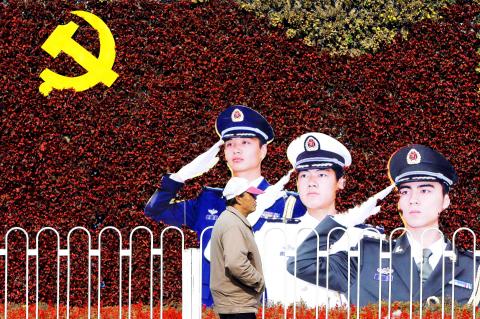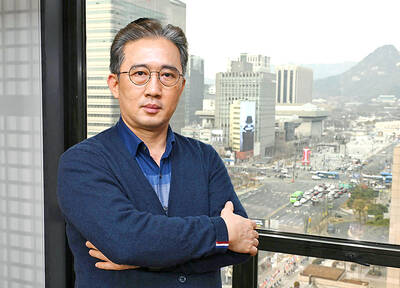China has reshuffled its military top brass in a move analysts said yesterday was probably aimed at ensuring President Hu Jintao (胡錦濤) remains commander-in-chief of the military after a 10-yearly leadership change.
At a top Chinese Communist Party meeting on Sunday, Hu oversaw the promotion of generals Fan Changlong (范長龍) and Xu Qiliang (許其亮) as vice chairmen of the powerful 12-member Central Military Commission (CMC), Xinhua news agency said.
Hu, the CMC chairman, is set to step down as head of the ruling party at a congress starting this week and will retire as national president in March next year as part of the leadership change.

Photo: Reuters
However, Willy Lam (林和立), a China politics expert at the Chinese University of Hong Kong, said: “Hu Jintao would want to serve another five years [as CMC chief], particularly given the fact that he has to watch over his political proteges ... and protect his political legacy.”
“As long as he is the CMC chief, he will still be the power behind the throne,” Lam said.
According to Lu Siqing (盧四清) head of the Hong Kong-based Information Centre for Human Rights and Democracy, which seeks to advance political reform in China, both promoted generals have close ties to Hu.
Xu is the first air force general to become a vice chairman of the committee, and his ascension also reflects the importance China places on quickly developing its air capability.
China’s 2.3 million-strong military forces include nuclear-tipped ballistic missiles and a recently commissioned second-hand aircraft carrier purchased from Ukraine.
The two incoming CMC vice chairmen will be tasked with pushing forward the modernization of the military and overseeing the increasingly powerful arsenal.
Unlike most modern states the military is directly run by the ruling party, not by the government, an arrangement that stems from the revolution that brought the party to power in 1949.
Mao Zedong (毛澤東) — who said that “power comes from the barrel of the gun” — used the People’s Liberation Army not only to advance revolution, but also to protect the party’s political power, Lam said.
Hu took over control of the party from former Chinese president Jiang Zemin (江澤民) in 2002 but, as part of China’s opaque and secretive political process, only succeeded him as CMC chairman in 2004.
There was also a possibility that Hu would only retain the CMC chairmanship for an extra two years, Lam said, long enough to let him influence the naming of the future heir to Chinese Vice President Xi Jinping (習近平), his own successor as party head and president.
He could also protect his protege, Chinese Vice Premier Li Keqiang (李克強), who is set to take the place of outgoing Chinese Premier Wen Jiabao (溫家寶), and seek to place other key allies in top posts at the 19th Party Congress in 2017, Lam said.
Xi was effectively chosen as China’s next core leader in 2007 in a selection process heavily influenced by Jiang, who had already stepped down.
In a statement, Lu said: “Hu Jintao will seek to continue on as chairman of the Central Military Commission for another five years until 2017.”
“This is due to worries over Xi Jinping among a lot of people in the higher levels of the military,” he said.
Xi was named a CMC vice chairman in 2010 in a rocky approval process that reportedly took more than a year to complete.
“If Hu Jintao retains his seat for another year or so, this certainly maintains the previous political practice,” Kenneth Jarrett, a China-based director for the APCO Worldwide consultancy, told reporters.
“But I would say it’s not good for China in the sense that you have a divided leadership, where you have Hu Jintao who will have the allegiance of the military at the very top even though he has given up all of his other positions,” he said.

VAGUE: The criteria of the amnesty remain unclear, but it would cover political violence from 1999 to today, and those convicted of murder or drug trafficking would not qualify Venezuelan Acting President Delcy Rodriguez on Friday announced an amnesty bill that could lead to the release of hundreds of prisoners, including opposition leaders, journalists and human rights activists detained for political reasons. The measure had long been sought by the US-backed opposition. It is the latest concession Rodriguez has made since taking the reins of the country on Jan. 3 after the brazen seizure of then-Venezuelan president Nicolas Maduro. Rodriguez told a gathering of justices, magistrates, ministers, military brass and other government leaders that the ruling party-controlled Venezuelan National Assembly would take up the bill with urgency. Rodriguez also announced the shutdown

Chinese President Xi Jinping’s (習近平) purge of his most senior general is driven by his effort to both secure “total control” of his military and root out corruption, US Ambassador to China David Perdue said told Bloomberg Television yesterday. The probe into Zhang Youxia (張又俠), Xi’s second-in-command, announced over the weekend, is a “major development,” Perdue said, citing the family connections the vice chair of China’s apex military commission has with Xi. Chinese authorities said Zhang was being investigated for suspected serious discipline and law violations, without disclosing further details. “I take him at his word that there’s a corruption effort under

China executed 11 people linked to Myanmar criminal gangs, including “key members” of telecom scam operations, state media reported yesterday, as Beijing toughens its response to the sprawling, transnational industry. Fraud compounds where scammers lure Internet users into fake romantic relationships and cryptocurrency investments have flourished across Southeast Asia, including in Myanmar. Initially largely targeting Chinese speakers, the criminal groups behind the compounds have expanded operations into multiple languages to steal from victims around the world. Those conducting the scams are sometimes willing con artists, and other times trafficked foreign nationals forced to work. In the past few years, Beijing has stepped up cooperation

The dramatic US operation that deposed Venezuelan president Nicolas Maduro this month might have left North Korean leader Kim Jong-un feeling he was also vulnerable to “decapitation,” a former Pyongyang envoy to Havana said. Lee Il-kyu — who served as Pyongyang’s political counselor in Cuba from 2019 until 2023 — said that Washington’s lightning extraction in Caracas was a worst-case scenario for his former boss. “Kim must have felt that a so-called decapitation operation is actually possible,” said Lee, who now works for a state-backed think tank in Seoul. North Korea’s leadership has long accused Washington of seeking to remove it from power